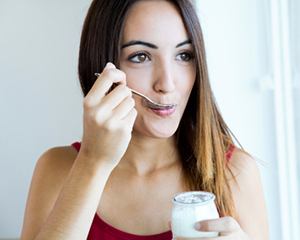Snacking Can Increase the Chances of Tooth Decay by Eating Away at Your Enamel
Posted on 4/1/2025 by Singing River Dentistry - Athens |
 Have you ever noticed a white spot forming on your tooth and wondered what it meant? That could possibly be the first sign of tooth decay, also known as a cavity. Tooth decay starts when leftover food debris (including sugars and carbohydrates) and bacteria interact, forming plaque which adheres to tooth surfaces as a sticky layer. Have you ever noticed a white spot forming on your tooth and wondered what it meant? That could possibly be the first sign of tooth decay, also known as a cavity. Tooth decay starts when leftover food debris (including sugars and carbohydrates) and bacteria interact, forming plaque which adheres to tooth surfaces as a sticky layer.
When plaque isn't removed through proper brushing and flossing, acids produced by harmful bacteria in plaque break down the enamel (the white, hard outer surface of your teeth.) Eventually, if you aren't taking care of your oral hygiene or having regular dental care, the decay progresses through the hard layers of your teeth and reaches the softer pulp inside, leading to pain and discomfort. This is when it is crucial to seek professional advice, because you will likely experience toothaches, swelling around the tooth, a bad taste in your mouth, and the sensitivity of hot and cold beverages.
Snacking & The Increase in the Chance of Tooth Decay
If you enjoy snacking during the day between meals like so many of us do, just make sure that you're aware of the risks and you're aware of your snacking and drink choices to try to minimize the damage it might have on your oral health:
| • |
When you snack, you might not have your toothbrush handy to remove that debris like you might post-breakfast, lunch, etc., so those particles sit on your teeth longer and have more time to create plaque. |
| • |
The longer sugars (found even in foods like bread and cheese) linger in your mouth, the longer bacteria feed, causing an increased rate of acid production and a higher probability of damage. |
| • |
Some sugary and starchy foods (chips, soda, candy) tend to stick to your teeth longer, therefore giving them even more time to cause a problem! |
The same can be said to any sugary drinks that may be consumed. For example, sipping a soda over an hour will likely do more damage to enamel than having just 1 or 2 gulps at a time.
The good news for anyone with a bad sweet tooth or those prone to snacking? By taking proper care of your oral hygiene by brushing and flossing 2-3 times per day along with regular professional care like checkups every 6 months and bitewing x-rays, you are less likely to suffer the consequences of snacking. You should also avoid consuming those sugary drinks in excess and instead stick to water. If you must snack, opt for something without sugar such as almonds. These healthy fats are not only a good alternative but also beneficial to your overall health!
Ultimately, taking care of your health requires a balanced perspective when it comes to nutrition and hygiene. If you maintain healthy snack habits and follow through with good oral care and regular visits at your dentist office, there is no reason not to allow yourself a sweet treat once in a while!
|
|
